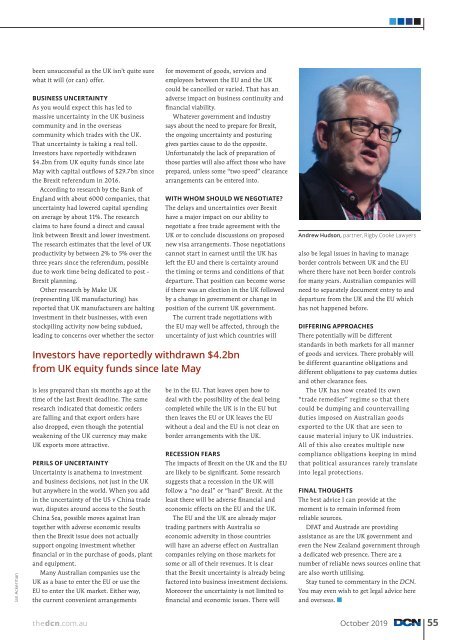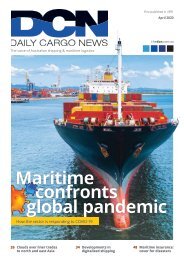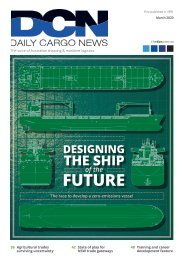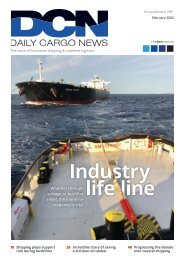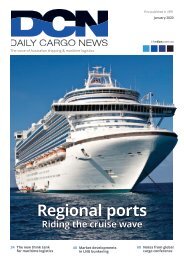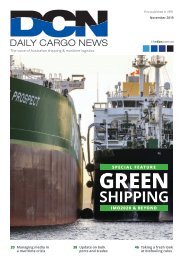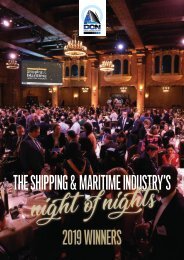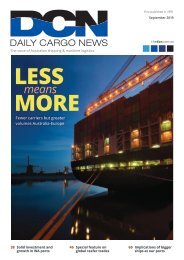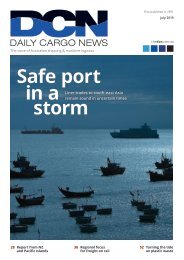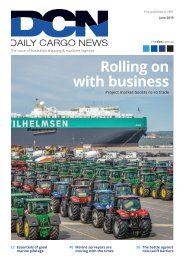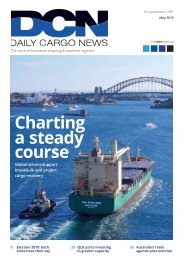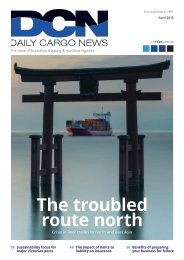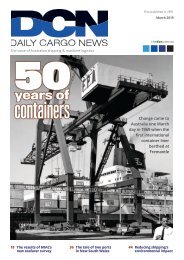DCN October Edition 2019
Create successful ePaper yourself
Turn your PDF publications into a flip-book with our unique Google optimized e-Paper software.
Ian Ackerman<br />
been unsuccessful as the UK isn’t quite sure<br />
what it will (or can) offer.<br />
BUSINESS UNCERTAINTY<br />
As you would expect this has led to<br />
massive uncertainty in the UK business<br />
community and in the overseas<br />
community which trades with the UK.<br />
That uncertainty is taking a real toll.<br />
Investors have reportedly withdrawn<br />
$4.2bn from UK equity funds since late<br />
May with capital outflows of $29.7bn since<br />
the Brexit referendum in 2016.<br />
According to research by the Bank of<br />
England with about 6000 companies, that<br />
uncertainty had lowered capital spending<br />
on average by about 11%. The research<br />
claims to have found a direct and causal<br />
link between Brexit and lower investment.<br />
The research estimates that the level of UK<br />
productivity by between 2% to 5% over the<br />
three years since the referendum, possible<br />
due to work time being dedicated to post -<br />
Brexit planning.<br />
Other research by Make UK<br />
(representing UK manufacturing) has<br />
reported that UK manufacturers are halting<br />
investment in their businesses, with even<br />
stockpiling activity now being subdued,<br />
leading to concerns over whether the sector<br />
is less prepared than six months ago at the<br />
time of the last Brexit deadline. The same<br />
research indicated that domestic orders<br />
are falling and that export orders have<br />
also dropped, even though the potential<br />
weakening of the UK currency may make<br />
UK exports more attractive.<br />
PERILS OF UNCERTAINTY<br />
Uncertainty is anathema to investment<br />
and business decisions, not just in the UK<br />
but anywhere in the world. When you add<br />
in the uncertainty of the US v China trade<br />
war, disputes around access to the South<br />
China Sea, possible moves against Iran<br />
together with adverse economic results<br />
then the Brexit issue does not actually<br />
support ongoing investment whether<br />
financial or in the purchase of goods, plant<br />
and equipment.<br />
Many Australian companies use the<br />
UK as a base to enter the EU or use the<br />
EU to enter the UK market. Either way,<br />
the current convenient arrangements<br />
for movement of goods, services and<br />
employees between the EU and the UK<br />
could be cancelled or varied. That has an<br />
adverse impact on business continuity and<br />
financial viability.<br />
Whatever government and industry<br />
says about the need to prepare for Brexit,<br />
the ongoing uncertainty and posturing<br />
gives parties cause to do the opposite.<br />
Unfortunately the lack of preparation of<br />
those parties will also affect those who have<br />
prepared, unless some “two speed” clearance<br />
arrangements can be entered into.<br />
WITH WHOM SHOULD WE NEGOTIATE?<br />
The delays and uncertainties over Brexit<br />
have a major impact on our ability to<br />
negotiate a free trade agreement with the<br />
UK or to conclude discussions on proposed<br />
new visa arrangements. Those negotiations<br />
cannot start in earnest until the UK has<br />
left the EU and there is certainty around<br />
the timing or terms and conditions of that<br />
departure. That position can become worse<br />
if there was an election in the UK followed<br />
by a change in government or change in<br />
position of the current UK government.<br />
The current trade negotiations with<br />
the EU may well be affected, through the<br />
uncertainty of just which countries will<br />
Investors have reportedly withdrawn $4.2bn<br />
from UK equity funds since late May<br />
be in the EU. That leaves open how to<br />
deal with the possibility of the deal being<br />
completed while the UK is in the EU but<br />
then leaves the EU or UK leaves the EU<br />
without a deal and the EU is not clear on<br />
border arrangements with the UK.<br />
RECESSION FEARS<br />
The impacts of Brexit on the UK and the EU<br />
are likely to be significant. Some research<br />
suggests that a recession in the UK will<br />
follow a “no deal” or “hard” Brexit. At the<br />
least there will be adverse financial and<br />
economic effects on the EU and the UK.<br />
The EU and the UK are already major<br />
trading partners with Australia so<br />
economic adversity in those countries<br />
will have an adverse effect on Australian<br />
companies relying on those markets for<br />
some or all of their revenues. It is clear<br />
that the Brexit uncertainty is already being<br />
factored into business investment decisions.<br />
Moreover the uncertainty is not limited to<br />
financial and economic issues. There will<br />
Andrew Hudson, partner, Rigby Cooke Lawyers<br />
also be legal issues in having to manage<br />
border controls between UK and the EU<br />
where there have not been border controls<br />
for many years. Australian companies will<br />
need to separately document entry to and<br />
departure from the UK and the EU which<br />
has not happened before.<br />
DIFFERING APPROACHES<br />
There potentially will be different<br />
standards in both markets for all manner<br />
of goods and services. There probably will<br />
be different quarantine obligations and<br />
different obligations to pay customs duties<br />
and other clearance fees.<br />
The UK has now created its own<br />
“trade remedies” regime so that there<br />
could be dumping and countervailing<br />
duties imposed on Australian goods<br />
exported to the UK that are seen to<br />
cause material injury to UK industries.<br />
All of this also creates multiple new<br />
compliance obligations keeping in mind<br />
that political assurances rarely translate<br />
into legal protections.<br />
FINAL THOUGHTS<br />
The best advice I can provide at the<br />
moment is to remain informed from<br />
reliable sources.<br />
DFAT and Austrade are providing<br />
assistance as are the UK government and<br />
even the New Zealand government through<br />
a dedicated web presence. There are a<br />
number of reliable news sources online that<br />
are also worth utilising.<br />
Stay tuned to commentary in the <strong>DCN</strong>.<br />
You may even wish to get legal advice here<br />
and overseas.<br />
thedcn.com.au <strong>October</strong> <strong>2019</strong> 55


